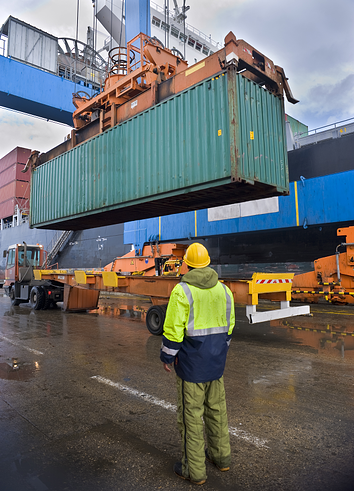ILWU Takes Advantage of No Contract, Slowing Down Port of Portland
 In all the joint statements from the Pacific Maritime Association (PMA) and International Longshore and Warehouse Union (ILWU) the reassurance that “both parties have pledged to keep cargo moving” has been included.
In all the joint statements from the Pacific Maritime Association (PMA) and International Longshore and Warehouse Union (ILWU) the reassurance that “both parties have pledged to keep cargo moving” has been included.
Apparently, for the ILWU that pledge means they’ll keep cargo moving everywhere except at the Port of Portland.
The Journal of Commerce (JOC) reports:
The operator of Portland’s only container terminal charged this week that crane productivity hit a new low of 7.5 moves per hour because International Longshore and Warehouse Union members are stepping up their hard-timing tactics now that there is no longshore contract in effect.
Maybe, I’m being harsh. There is still movement. I guess the pledge could mean the ILWU will keep cargo moving along the west coast, but really, really slowly at the Port of Portland.
To give perspective to just how slow ILWU members are moving cargo in Portland, let’s compare their current crane productivity of 7.5 moves per hour to the high end of productivity over in Charleston where operators’ crane productivity is over 40 moves per hour according to another article from the JOC.
Here’s how the productivity at Portland would stack up to that of Charleston over the course of an 8-hour work day.
- Charleston – 320 moves per crane
- Portland – 60 moves per crane
Let’s just expand that to a 5-day work week (although ports tend to operate at more than 8 hours a day, 5 days a week).
- Charleston – 1,600 moves per crane
- Portland – 300 moves per crane
Maybe it’s not fair to compare the productivity of the ILWU members at Portland to what is happening at Charleston. After all, Charleston is at the extreme high end of productivity.
“Most terminal operators in the U.S. cite 30 moves per crane per hour as being a standard to strive for,” according to that second JOC article. So let’s see those numbers compared to this 30 moves per hour standard.
Portland versus standard over 8 hours:
- Standard – 240 moves per crane
- Portland – 60 moves per crane
Portland versus standard over 40 hours:
- Standard – 1,200 moves per crane
- Portland – 300 moves per crane
Oh, yeah. That’s much better. Nevermind. Working at a quarter of the industry standard productivity rate is fine.
Except it’s not.
“Hanjin last year threatened to leave Portland if productivity does not return to the high 20s,” reported the JOC.
It was actually announced that Hanjin would stop calling on the Port of Portland last year, which would have ended almost 20 years of the carrier serving the port. By far the largest carrier serving the Port of Portland, Hanjin no longer calling there would be disastrous.
Not only would Hanjin leaving the Port of Portland hurt the local economy, importers, and exporters, but it would also cost ILWU jobs. The pullout would “end a $250,000 weekly payroll for longshore workers who load and unload the vessels at Terminal 6,” says the JOC.
Jobs at Terminal 6 are what started this whole hard-timing or slowdown tactics move from the ILWU at the Port of Portland. 2 jobs to be precise.
The International Brotherhood of Electrical Workers (IBEW) had been handling the plugging, unplugging, and monitoring of reefer containers at the Port of Portland for 30 years. When the Port of Portland brought in ICTSI to handle terminal operations (largely because of inefficient work practices) and ICTSI joined the PMA but didn’t take the 2 reefer monitoring jobs away from the IBEW and give them to the ILWU, ILWU members really started slowing down productivity.
Near the end of last year, the ILWU was awarded the two jobs; however, poor productivity has continued and worsened since the expiration of the ILWU contract on July 1st.
According to a JOC article quoting Bill Wyatt, executive director at the Port of Portland points to ICTSI coming in and trying to clean up inefficient work practices as the real source of the ILWU dockworker’s discontent at the port:
“We had to become more efficient, so ICTSI got on to these high-cost work practices,” Wyatt said. It is ICTSI’s attack on inefficient work practices that is the real cause of the animosity between the union and ICTSI, Wyatt maintains.
The Port of Portland managed to keep Hanjin at the port by offering incentives, but the plummeting of ILWU’s productivity still puts the port at risk of losing the carrier (and other business besides).
In fact, the port already has lost much business. JOC reports, “Portland’s container volume plunged to 178,451 20-foot container units in 2013 from 339,571 TEUs in 2003, according to port statistics.”
If Portland ends up losing Hanjin because of their poor productivity, the cost of the ILWU’s hard-timing tactics at the port will cost a lot more than the 2 jobs ILWU managed to wrestle away from the IBEW.
As no news of resolution to the ILWU coast-wide contract negotiations have surfaced, ILWU actions at the Port of Portland despite the union’s pledge to keep cargo moving makes for an uneasy feeling that slowdowns could happen at other west coast ports as well.
![]()
Source: Export

